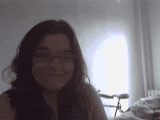This past week, NYC public schools were closed. Our branch was teeming with kids, many of them with a biographical paper on a historic African-American due this upcoming Monday. Each day, at least one kid came up to me while on the reference desk and asked for help locating materials. What a perfect opportunity to drop some media literacy knowledge! Wooooo.
So, instead of just getting them a book about Rosa Parks, I asked them to let me show them our Articles & Databases. Since I'd say the majority were 5th graders, many weren't familiar. Here is a typographical re-enactment of how a conversation would go -
Little Carlos: I need a book on Rosa Parks
Me: Are you doing a report? What grade? How many pages? etc.
Carlos: The teacher said I have to use one book
Me: OK cool. I can get you a book in a minute, but why don't you pull up that chair and I can show you some more really helpful resources the library has for you. You have a couple minutes?
Carlos: Um..I guess..
Me: You know wikipedia?
Carlos: Yeah!
Me: Yeah we're not using wikipedia. I could log on right now and change what the wiki article on Rosa Parks says...and say that she was born on Saturn and was half-unicorn and was the most famous chef in King Arthur's Time. Because anyone can make a website...so just because you see it online, that doesn't mean it's ture
Carlos: (this girl is weird...)
Me: So the library subscribes to a bunch of different databases that compile information from magazines, newspapers, papers that college professors write...and puts them online.
*goes to website and walks through the process of getting to the databases click by click*
So here we are at Wilson Web's Biographical Index thing. This looks kinda familiar right? Looks a little like google? Well it works like google, except its only searching the articles included on this site. The things we'll find will have authors and will have been edited and researched and factchecked, and on a regular website, we aren't always sure that that is the case.
Carlos: Oh ok yeah.
Me: So let me write down the steps for you to get to this database so you can DIY.
Carlos: Emily you're the coolest and best librarian ever.
*Scene*
It might not be possible to gather every kidlet in an urban public library setting and make them sit while you talk about the importance of being critical thinkers when it comes to finding information. But it is easy enough to jump on it when an opportunity like this comes up. Carlos might think twice now the next time he sees something on wikipedia or elsewhere, and possibly might consult a database to back up whatever answer he finds.
Saturday, February 21, 2009
Subscribe to:
Post Comments (Atom)


That sounds like a really great approach to media literacy education--one child at a time. I agree that in larger libraries that is the best approach. The more I've been thinking (in a rather scattered way) about media literacy education the more I think there really is no ideal way to teach it to everyone since context is so important to explain the relevance of media literacy and other technologies. Without context or some reason to justify media literacy, education on the subject can seem rather hopeless--a bit like learning to type with a laminated photo of a keyboard instead of an actual computer. (Though to be fair part of my grade school typing instruction was conducted that way and I am still a fairly decent typist . . .)
ReplyDeleteGood thinking, Emily. I like the way you used the opportunity presented to you. One question: if a child comes in and says he needs to do a report on Rosa Parks, and says he can only use a book, not something from the Internet, would you still show him the databases? Because I have a number of children who come in and specifically ask for books, not something from the Internet. Are you thinking about weaving media literacy and database education into class visits and other outreach events?
ReplyDeleteI enjoyed your Carlos reenactment and appreciated your comment to him on how wikipedia can be manipulated to say pretty mucy anyting. It reminded me of the great 30 ROCK episode when one of the characters has to research Janis Joplin for a role and she stumbles upon crazy erroneous info that her co-workers have uploaded e.g. she ate cats and walked with crutches. In addition to being hysterical it served as a reminder of two things: good research has to extend beyond one source (no matter how popular or factual-seeming); it is not enough to be critical of the information we gather, we must also be critical of the methods by which we gather.
ReplyDelete